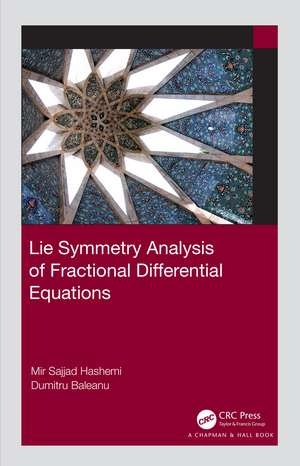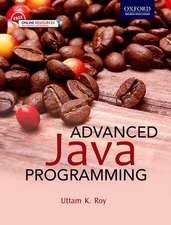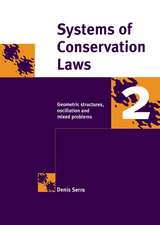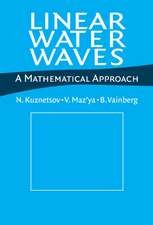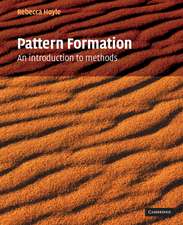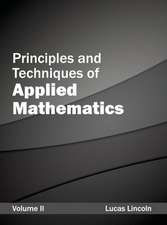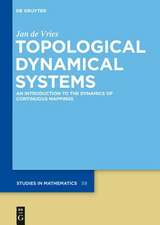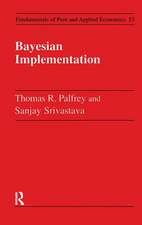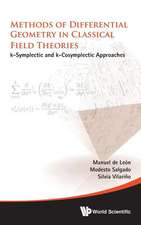Lie Symmetry Analysis of Fractional Differential Equations
Autor Mir Sajjad Hashemi, Dumitru Baleanuen Limba Engleză Hardback – 10 iul 2020
It is a natural to ask if fractional calculus, as a nonlocal calculus, can produce new results within the well-established field of Lie symmetries and their applications.
In Lie Symmetry Analysis of Fractional Differential Equations the authors try to answer this vital question by analyzing different aspects of fractional Lie symmetries and related conservation laws. Finding the exact solutions of a given fractional partial differential equation is not an easy task, but is one that the authors seek to grapple with here. The book also includes generalization of Lie symmetries for fractional integro differential equations.
Features
- Provides a solid basis for understanding fractional calculus, before going on to explore in detail Lie Symmetries and their applications
- Useful for PhD and postdoc graduates, as well as for all mathematicians and applied researchers who use the powerful concept of Lie symmetries
- Filled with various examples to aid understanding of the topics
| Toate formatele și edițiile | Preț | Express |
|---|---|---|
| Paperback (1) | 367.98 lei 6-8 săpt. | |
| CRC Press – 29 apr 2022 | 367.98 lei 6-8 săpt. | |
| Hardback (1) | 1128.20 lei 6-8 săpt. | |
| CRC Press – 10 iul 2020 | 1128.20 lei 6-8 săpt. |
Preț: 1128.20 lei
Preț vechi: 1375.86 lei
-18% Nou
Puncte Express: 1692
Preț estimativ în valută:
215.88€ • 225.86$ • 179.33£
215.88€ • 225.86$ • 179.33£
Carte tipărită la comandă
Livrare economică 02-16 aprilie
Preluare comenzi: 021 569.72.76
Specificații
ISBN-13: 9780367441869
ISBN-10: 0367441861
Pagini: 222
Dimensiuni: 156 x 234 x 14 mm
Greutate: 0.49 kg
Ediția:1
Editura: CRC Press
Colecția Chapman and Hall/CRC
ISBN-10: 0367441861
Pagini: 222
Dimensiuni: 156 x 234 x 14 mm
Greutate: 0.49 kg
Ediția:1
Editura: CRC Press
Colecția Chapman and Hall/CRC
Cuprins
1. Lie symmetry analysis of integer order differential equations. 2. Group analysis and exact solutions of fractional partial differential. 3. Analytical lie group approach for solving the fractional integro-differential equations. 4. Nonclassical Lie symmetry analysis to fractional differential equations. 5. Conservation laws of the fractional differential equations.
Notă biografică
Mir Sajjad Hashemi is associate professor at the University of Bonab, Iran. His field of interests include the fractional differential equations, Lie symmetry method, Geometric integration, Approximate and analytical solutions of differential equations and soliton theory.
Dumitru Baleanu is professor at the Institute of Space Sciences, Magurele-Bucharest, Romania and visiting staff member at the Department of Mathematics, Cankaya University, Ankara, Turkey. His field of interests include the fractional dynamics and its applications in science and engineering, fractional differential equations, discrete mathematics, mathematical physics, soliton theory, Lie symmetry, dynamic systems on time scales and the wavelet method and its applications.
Dumitru Baleanu is professor at the Institute of Space Sciences, Magurele-Bucharest, Romania and visiting staff member at the Department of Mathematics, Cankaya University, Ankara, Turkey. His field of interests include the fractional dynamics and its applications in science and engineering, fractional differential equations, discrete mathematics, mathematical physics, soliton theory, Lie symmetry, dynamic systems on time scales and the wavelet method and its applications.
Recenzii
"Written by top experts in the field, this book is a modern and comprehensive approach to the Lie Symmetry groups, guiding the reader along the tortuous path through the theory of fractional differential operators".
— Carlo Cattani, University of Tuscia
"This book is the first to apply Lie symmetry analysis to fractional differential equations. Read this book and learn from one of the best."
—Elyas Shivanian, Imam Khomeini International University
"Lie symmetry analysis (or the Lie Method) has been extensively used for decades in the pursuit of finding exact solutions to partial differential equations. Yet, the Lie symmetry classification continues to receive a lot of attention in the field. Although not thoroughly pursued until more recently, fractional calculus may prove useful in the study of fractional differential equations. In this text, authors Hashemi (Univ. of Bonab, Iran) and Baleanu (Institute of Space Sciences, Romania) ask if there can be "conservation laws for fractional differential equations associated to real-world models?" They approach this question by analyzing fractional Lie symmetries, both classical and nonclassical, bringing the analysis to fractional partial differential equations and related self-adjointness and conservation laws. After a brief introduction to Lie symmetry analysis as applied to the integer-ordered Fornberg-Whitham and Black-Scholes equations, the authors investigate numerous fractional differential equations including the diffusion, Burger's, Airy's, and the gas dynamic equations. Once these are analyzed using nonclassical Lie symmetry analysis, the remainder of the text focuses on conservation laws and self-adjointness of fractional differential equations. [. . .] the volume of information provided in its scant 200 pages will certainly be useful to those interested in Lie symmetry analysis."
—Choice Review
"Written by top experts in the field, this book is a modern and comprehensive approach to the Lie Symmetry groups, guiding the reader along the tortuous path through the theory of fractional differential operators".
— Carlo Cattani, University of Tuscia
"This book is the first to apply Lie symmetry analysis to fractional differential equations. Read this book and learn from one of the best."
—Elyas Shivanian, Imam Khomeini International University
— Carlo Cattani, University of Tuscia
"This book is the first to apply Lie symmetry analysis to fractional differential equations. Read this book and learn from one of the best."
—Elyas Shivanian, Imam Khomeini International University
"Lie symmetry analysis (or the Lie Method) has been extensively used for decades in the pursuit of finding exact solutions to partial differential equations. Yet, the Lie symmetry classification continues to receive a lot of attention in the field. Although not thoroughly pursued until more recently, fractional calculus may prove useful in the study of fractional differential equations. In this text, authors Hashemi (Univ. of Bonab, Iran) and Baleanu (Institute of Space Sciences, Romania) ask if there can be "conservation laws for fractional differential equations associated to real-world models?" They approach this question by analyzing fractional Lie symmetries, both classical and nonclassical, bringing the analysis to fractional partial differential equations and related self-adjointness and conservation laws. After a brief introduction to Lie symmetry analysis as applied to the integer-ordered Fornberg-Whitham and Black-Scholes equations, the authors investigate numerous fractional differential equations including the diffusion, Burger's, Airy's, and the gas dynamic equations. Once these are analyzed using nonclassical Lie symmetry analysis, the remainder of the text focuses on conservation laws and self-adjointness of fractional differential equations. [. . .] the volume of information provided in its scant 200 pages will certainly be useful to those interested in Lie symmetry analysis."
—Choice Review
"Written by top experts in the field, this book is a modern and comprehensive approach to the Lie Symmetry groups, guiding the reader along the tortuous path through the theory of fractional differential operators".
— Carlo Cattani, University of Tuscia
"This book is the first to apply Lie symmetry analysis to fractional differential equations. Read this book and learn from one of the best."
—Elyas Shivanian, Imam Khomeini International University
Descriere
In this book, the authors try to answer vital Fractional differential equations questions by analyzing different aspects of fractional Lie symmetries and related conservation law.
